World Refugee Day: The Problems of Palestine and the Global Refugee Situation
2023.06.14
The words “refugee” and “conflict” are appearing more frequently in recent news reports. The number of people forced to flee their homes due to Russia’s invasion of Ukraine has increased and the fighting in Sudan has worsened as the world’s refugee problem becomes more serious. One of the most complex issues over the past 75 years has been the ongoing Israeli-Palestinian conflict in the Middle East.
On the occasion of World Refugee Day, June 20, we interviewed two specialists in refugee issues. Dr. Seita Akihiro has been working in the field for more than 10 years as Director of Health of the United Nations Relief and Works Agency for Palestine Refugees in the Near East (UNRWA). Abe Toshiya, the former Chief Representative of the JICA Palestine Office, has long been involved in supporting Palestine. We talked with them about the increasingly serious issue of refugees, how support can be provided, and whether there are any clues to solving the problems surrounding refugees.
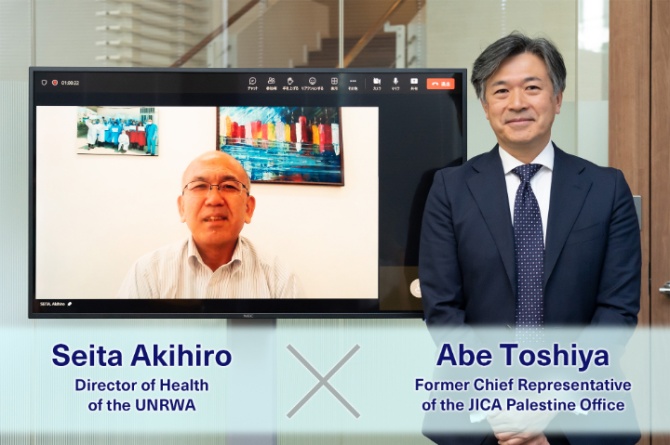
——According to the United Nations High Commissioner for Refugees (UNHCR), the number of refugees and internally displaced persons forced to flee their homes due to conflict and persecution in 2022 exceeded 100 million for the first time. This is more than double the figure of 42.7 million from 10 years earlier. What are your views on this current situation?
Seita Akihiro:
No one in the world, myself included, could have imagined that the number of global refugees would increase that much. The refugee situation is also worsening here in the Middle East. There was another airstrike in Gaza this morning,* and the number of people displaced from their homes continues to grow.
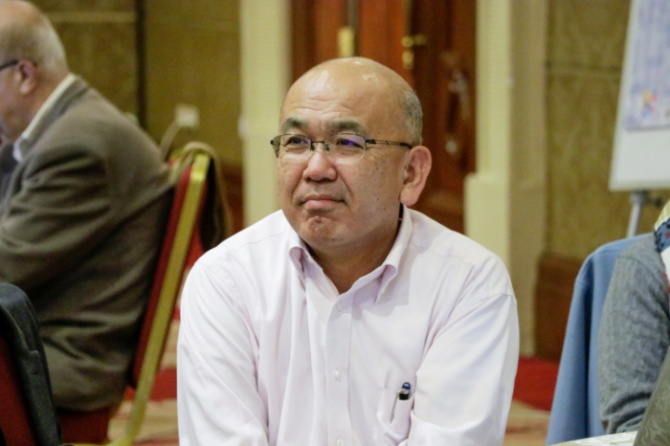
Dr. Seita Akihiro is Director of Health at the United Nations Relief and Works Agency for Palestine Refugees in the Near East (UNRWA), which provides medical, educational, social welfare, and other assistance to Palestine refugees. He has held this position since 2010, after working for the World Health Organization (WHO) for about 15 years on infectious diseases and AIDS control in the Middle East. He took part in this interview online from Jordan, where he is presently based.
Abe Toshiya:
We must recognize that this is a very serious situation. That figure of more than 100 million people is equal to about 80 percent of Japan’s population, or one out of every 80 people in the world.
The significant factor in these situations is the conflict. The UNHCR states that the solution for refugees is either voluntary repatriation [returning to their country of origin], integration in the host country, or resettlement in a third country. Of course, going home is preferable, but it’s impossible unless the conflict ends and peace is achieved. The longer the situation is prolonged, the more the number of refugees from Palestine, Syria, Afghanistan, Ukraine, Sudan, and other countries will increase.
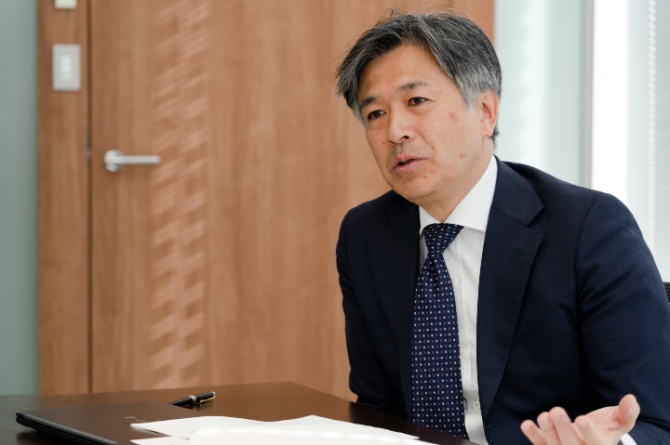
Abe Toshiya is the Director General of the JICA Evaluation Department. After joining JICA in 1993, he was in charge of Palestinian-related matters at the Operations Strategy Department. He was involved in the establishment of the Palestine Office in 1998 and was posted there for three years. From 2004, he was in charge of Palestinian-related affairs at the Middle East and Europe Department. In 2007, he was seconded to the UNHCR Headquarters as Senior Development Officer in charge of humanitarian and development partnerships. He served as Chief Representative of the JICA Palestine Office from January 2019 to February 2023.
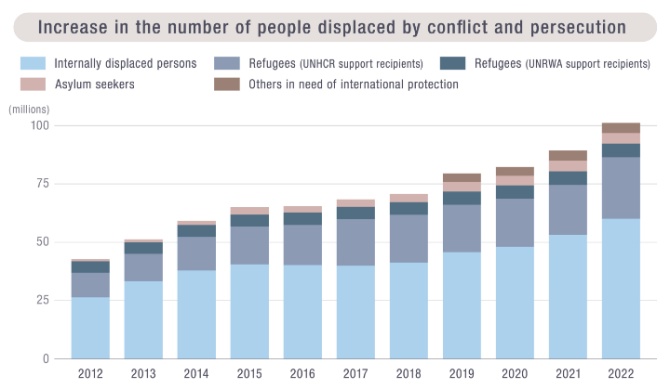
Note: Statistics for 2022 are estimates as of June 9, 2022. The figure shown under “Others in need of international protection” (2019–2022) represents Venezuelans who fled their country.
Source: UNHCR Refugee Data Finder
——The 1948 Arab-Israeli War broke out following the proclamation of the State of Israel, and about 800,000 people were forced to flee what had been the British Mandate for Palestine. Though they have been longing to return, the Palestinians have now been living as refugees in neighboring countries for 75 years, and their numbers have grown to approximately 5.9 million. How would you describe the current situation of these Palestine refugees?
Seita:
My honest opinion is that we are “in a tunnel with no exit.” The United Nations Relief and Works Agency for Palestine Refugees in the Near East (UNRWA) was established by the United Nations in 1949 and has been active since 1950. The period of activity was originally set for three years. In other words, the world thought then that the problem of Palestine refugees could be solved in that amount of time. Today, 73 years later, the political problems that resulted in the Palestine refugee situation are still not expected to be resolved in the foreseeable future. There is no progress in peace negotiations between the Palestinian Authority and Israel, and the political and economic situation in neighboring countries such as Syria and Lebanon, where many Palestine refugees live, is continuing to worsen.
None of the Palestine refugees wanted to be refugees or saw themselves being caught in the same situation for 75 years. But four generations of Palestinians have now lived their lives as refugees, and their sense of hopelessness is growing stronger. The UNRWA’s role in supporting children’s health and education is becoming increasingly important. Parents are eager to “do something about their children’s future,” even as they can’t do anything about their own.
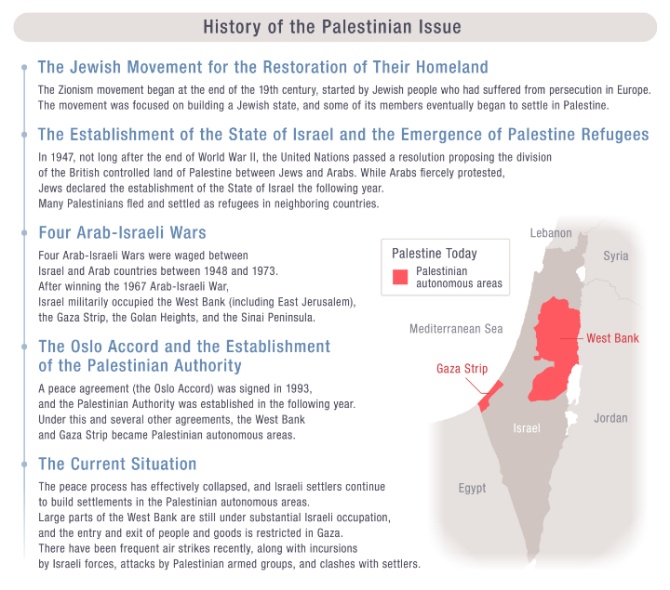
Abe:
I joined JICA in 1993 and was immediately assigned to the role of country officer for Palestine. The Oslo Accord (a peace agreement between Palestine and Israel) was signed that same year. Although hopes for the establishment of a Palestinian Authority government were high, peace negotiations have now completely stalled. The international community has been working toward a “two-state solution” that would establish a Palestinian Authority state. But progress has been slow, a solution has yet to be found, and the international community's interest has waned.
What concerns me most is that the process of transiting from humanitarian assistance to medium- to long-term economic development is being reversed. In other words, people are once again finding it difficult to even make ends meet.
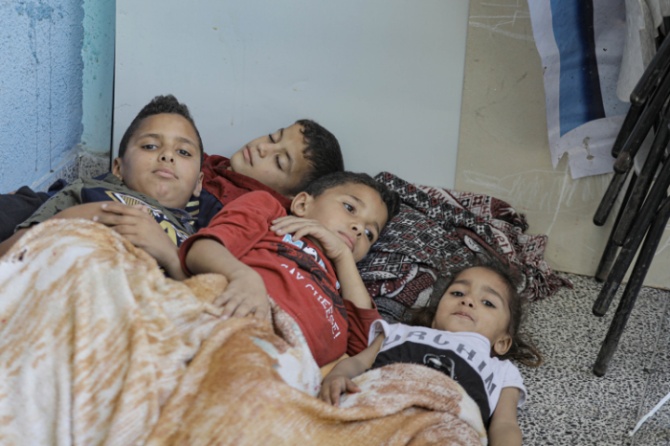
Palestine refugee children sleep on the floor of a UNRWA-run elementary school that was designated as a shelter during Israeli airstrikes. (Gaza, May 2021) (Photo courtesy of the UNRWA)
——What kind of support are the UNRWA and JICA providing now, given the political situation and the increasingly difficult living conditions of the Palestine refugees?
Seita:
I am involved in providing medical care at 140 clinics in the UNRWA's area of operation in Jordan, Lebanon, and Syria, as well as in the West Bank, including East Jerusalem, and the Palestinian autonomous areas in Gaza.
Currently, 70 to 80 percent of the deaths of Palestine refugees are due to lifestyle-related diseases such as diabetes and hypertension. The main cause of these diseases is the lack of financial resources, which forces the refugees to eat an unbalanced diet. It is important for chronic lifestyle-related diseases to be treated continuously by the same doctors and nurses, so we have introduced a “family doctor system.” In addition, a system of electronic medical records has been introduced so that the patient's medical history, examination results, list of medications, and other treatment-related information can be viewed at a glance. As life for the refugees is harsh with little hope for the future, there is also an urgent need to address domestic violence and mental healthcare issues.
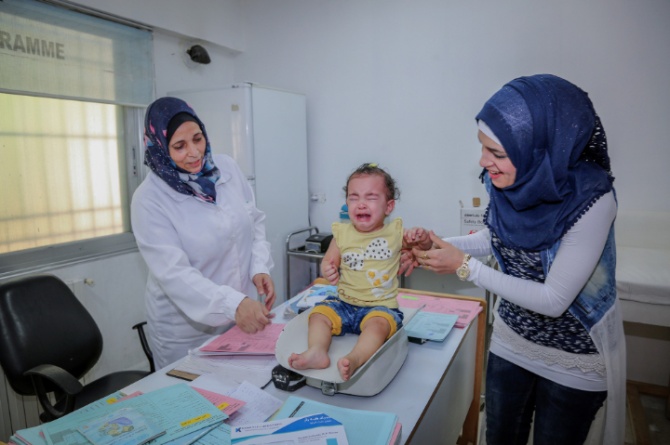
The UNRWA medical clinic in Syria. Palestinian refugee children were weighed as part of a maternal and child health service program. (Photo courtesy of the UNRWA)
Abe:
As a development agency, JICA focuses on improving living conditions, human resource development, and capacity building, rather than on emergency humanitarian assistance. We are responding to the protracted refugee situation and continuing with a project to improve living conditions in 15 Palestine refugee camps in the West Bank. Homes originally built as temporary housing are now in poor shape and the infrastructure is inadequate. Through this project, the residents initiate improvement plans and use crowdfunding and other means to better their living environment. We help people to live in safety and with dignity even under such difficult circumstances.
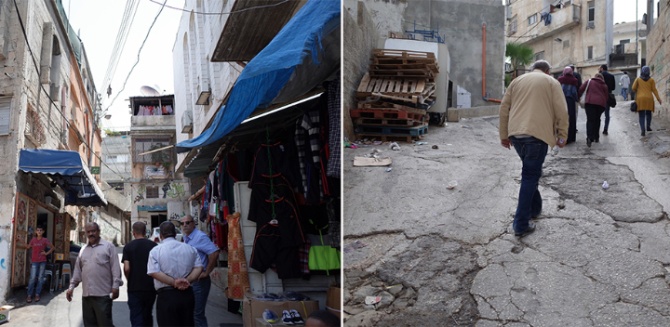
Buildings and street vendors stand side by side in a small space in a refugee camp. The buildings are being extended and remodeled with no oversight, and the roads are deteriorating.
Seita:
We have also been working with JICA to introduce a Maternal and Child Health Handbook, which has become known locally as the “JICA Book.” Pregnant women, who number more than 90,000 a year, all utilize the handbook. Japan Overseas Cooperation Volunteers are also involved in teaching subjects such as music as well as physical education at elementary and junior high schools run by the UNRWA. JICA is a strategic partner in supporting Palestine refugees.
Abe:
The Refugee Camp Improvement Project in Palestine marked the first time that JICA stepped into a camp to directly provide assistance. The project creates opportunities for residents of various social statuses who have had few chances to speak out in the past. These very active residents include women, people with disabilities, and young people, who discuss future improvements in their living conditions. It is important to cooperate with the UNRWA, which is well versed in the lives of the residents and the conditions in the camps. I believe it is also important that we continue to cooperate with each other in providing future support.
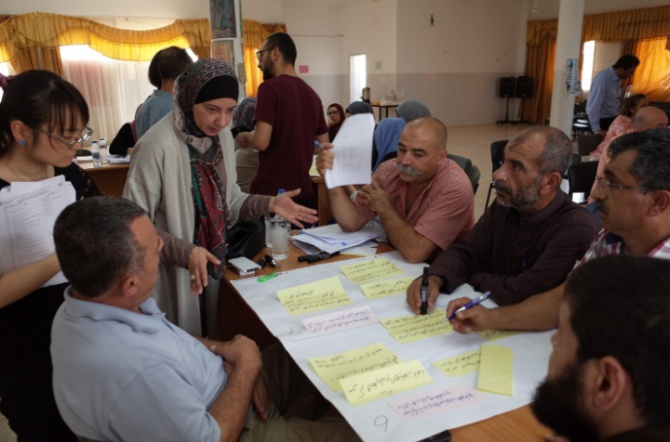
A forum was held for the residents to discuss plans for improving the camps. Women, people with disabilities, young people, and other residents who had not previously been involved in decision-making, actively participated.
——Neither the UNRWA nor JICA are able to step directly into the political issue of peace between Palestine and Israel. What role can aid agencies play in helping to find a solution?
Seita:
Of course, it is not our job to intervene in political issues, but we can create situations that contribute to solving the refugee problem. The UNRWA has over 30,000 employees, most of whom are Palestine refugees, with a small number of international staff, and this creates a system that allows refugees to solve their own problems. It is very important now, when the situation is so dire, to show Palestine refugees that the world has not given up on peace. We must help them to live with dignity and pride until the day that the political problems are resolved.
Abe:
Along with humanitarian assistance, one of the major roles of development agencies is to create an environment conducive to political solutions. For example, there is a 14-fold economic disparity in per capita GDP between Palestine and Israel, which leads to a disparity in power. JICA is supporting the development of Palestinian industries such as agriculture and tourism, as well as small and medium-sized enterprises, so that Palestinians can become economically independent. We believe that it would be even better if the reduction of economic disparities could lead to a political solution. We are collaborating with a Japanese IT startup to promote the cultivation of human resources in software development among young people in the Gaza Strip, and providing loans to the largest private bank in Palestine to encourage small and micro businesses to expand their operations.
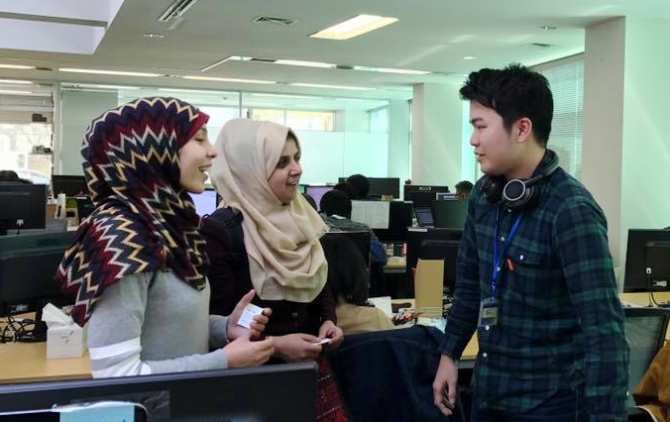
JICA is collaborating with Monstar Lab, an IT service development company, to support the creation of jobs for young people in the Gaza Strip. (Photo courtesy of Monstar Lab)
Seita:
This year marks exactly 70 years since Japan began supporting the UNRWA in 1953. Japan has continued to provide steady humanitarian assistance without any political bias—with its main agenda of seeking permanent peace—while cooperating with the international community, something that has been greatly appreciated in the region.
——Through your support for Palestine refugees, have you been able to come up with ideas to help solve any of the protracted problems surrounding the world’s refugees?
Seita:
We must protect the human rights and dignity of refugees. Those of us who provide support must show that we will not give up, that we will establish partnerships with those who will not give up and create systems with long lifespans. We will continue to provide support in any way possible. It is also important to share the results of this support with the world and broadcast the voices of the refugees so that they will not be forgotten. We believe that the issue of whether the nations of the world can find a way to end the war between Russia and Ukraine will largely determine the future resolution of the world's refugee problem.
Abe:
It is impossible for any single country or institution to solve the problems surrounding the world's refugees. It is important for the governments of host countries, aid organizations like JICA, and other international organizations to utilize each other's strengths to find solutions. With the prolonged conflicts, refugee support will increasingly require the coordination of humanitarian and development assistance.
All we see in the news are conflicts between people from different countries and with different ideologies. But beyond the fighting there are people who are being forced to leave their homes. Imagine what it would be like to no longer be able to live the life you chose, and to be separated from your family and friends. Although the refugees have limited opportunities to speak out for themselves, we have to recognize their strong desire to have their situation be understood by the world. It is important for all of us to acknowledge this fact.
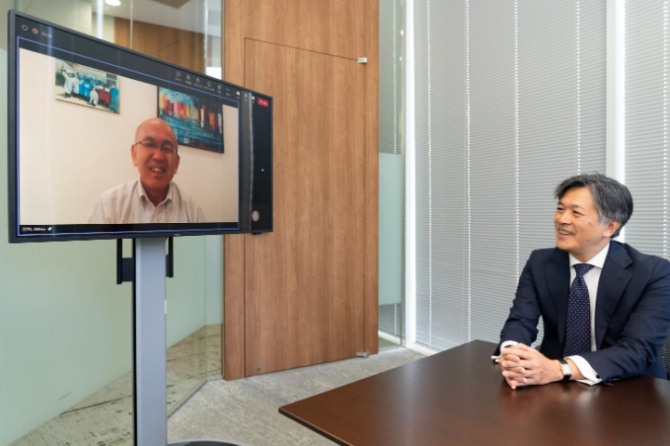
For this discussion, Seita and Abe were reunited online for the first time in a long time, and shared their hopes for further collaboration.
scroll